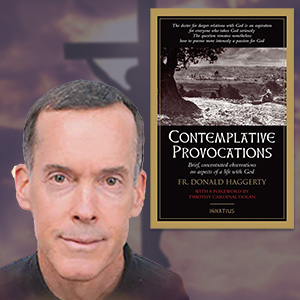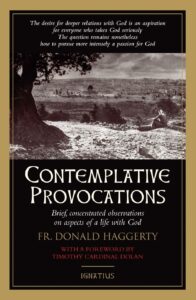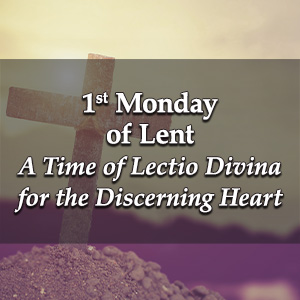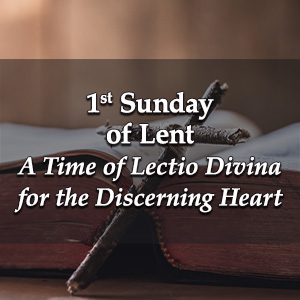Podcast: Play in new window | Download (Duration: 31:33 — 21.7MB) | Embed
Subscribe: Apple Podcasts | Spotify | Amazon Music | Android | Pandora | iHeartRadio | JioSaavn | Podchaser | Gaana | Podcast Index | Email | TuneIn | Deezer | Anghami | RSS | More
Dryness in Prayer: Is it Spiritual Desolation? – Spiritual Desolation: Be Aware, Understand, Take Action with Fr. Timothy Gallagher
 In part two of this conversation, Fr. Gallagher and Kris McGregor discuss prayer dryness causes: a lack of formation in prayer, changes in prayer practices, unshared burdens with God, and physical or emotional exhaustion. Fr. Gallagher makes of note the importance of discerning the specific cause of dryness and responding accordingly.
In part two of this conversation, Fr. Gallagher and Kris McGregor discuss prayer dryness causes: a lack of formation in prayer, changes in prayer practices, unshared burdens with God, and physical or emotional exhaustion. Fr. Gallagher makes of note the importance of discerning the specific cause of dryness and responding accordingly.
Kris raises questions about tears in spiritual experiences, to which Fr. Gallagher explains that tears can be a sign of spiritual consolation but are not necessary for experiencing God’s presence. He offers examples of how spiritual consolation can manifest and highlights the importance of being open and receptive to God’s gifts.
Discerning Hearts Reflection Questions:
- Identifying Dryness: How can you discern the cause of dryness in your prayer life, whether it be lack of formation, changing practices, unshared burdens, or exhaustion?
- Embracing Changes in Prayer: Are you open to allowing your prayer practices to evolve and simplify, recognizing that different forms of prayer may nourish you at different times?
- Sharing with God: Do you feel comfortable sharing your deepest burdens and emotions with God in prayer, knowing that He eagerly awaits your openness and offers understanding and mercy?
- Understanding Spiritual Consolation: Are you aware that tears can be a sign of spiritual consolation, reflecting joy, warmth, and closeness with God, and are you open to receiving this gift when it comes?
- Addressing Vulnerability to Desolation: How do you actively address dryness in your prayer life to avoid vulnerability to spiritual desolation, recognizing the importance of discerning and responding appropriately to your spiritual experiences?

From Setting the Captives Free: Personal Reflections on Ignatian Discernment of Spirits:
“Dryness may again result when persons need to share with God a burden, fear, shame, or anxiety that fills their hearts— and have as yet been unable to do so. They experience dry- ness: nothing seems to help in prayer, the time passes slowly and with distractions, and the prayer they attempt appears to lack life.
A husband and wife sit across the table from each other at dinner. He knows that she holds a burden in her heart that she has not been able to express and share with him. Until the burden is expressed and shared, they will struggle to speak together with their habitual ease and communion. Their conversation will remain on a superficial level—it will feel dry—while both know that something deeper needs to be communicated. A man once told me that for eleven years his prayer had been dry. A few questions revealed that his young son had died eleven years earlier. When, after some hesitancy and with some courage, he shared with the Lord the stored- up pain and anger in his heart, the dryness ceased, and prayer flowed again.
Other Forms of Dryness
Other forms of dryness may result from nonspiritual factors. When persons are physically exhausted, they may find their prayer dry: they simply do not have the physical energy to pray in their usual way. Adequate rest will resolve this “dryness.” Something similar may result from depletion of emotional energy. Persons who have expended great emotional energy in difficult situations and who try to pray may also find that their prayer is dry: they are affectively spent and struggle to be emotionally present to their prayer. Healthy ways of replenishing emotional energy will resolve this “dry- ness” as well.
None of these forms of dryness are experiences of spiritual desolation.23 Each has its individual cause and so its indi- vidual remedy. Good spiritual direction will be sensitive to the cause of such persons’ individual experiences of dryness and so assist them to respond appropriately, helping them to eliminate its cause or—should such “dryness” indicate growth toward simplified prayer—assisting them to negotiate it well.
If, however, the dryness bears the mark of spiritual des- olation—affective aridity coupled with discouragement, a sense of distance from God, a weakening of hope, various temptations, and the like—then such persons will recognize the enemy at work and hear the call to active and energetic resistance.”
Father Timothy M. Gallagher, O.M.V., was ordained in 1979 as a member of the Oblates of the Virgin Mary, a religious community dedicated to retreats and spiritual formation according to the Spiritual Exercises of St. Ignatius. Fr. Gallagher is featured on the EWTN series “Living the Discerning Life: The Spiritual Teachings of St. Ignatius of Loyola”. For more information on how to obtain copies of Fr. Gallaghers’s various books and audio which are available for purchase, please visit his website: frtimothygallagher.org



 1st Monday of Lent – A Time of Lectio Divina for the Discerning Heart Podcast
1st Monday of Lent – A Time of Lectio Divina for the Discerning Heart Podcast
 1st Sunday of Lent – A Time of Lectio Divina for the Discerning Heart Podcast
1st Sunday of Lent – A Time of Lectio Divina for the Discerning Heart Podcast Saturday after Ash Wednesday – A Time of Lectio Divina for the Discerning Heart Podcast
Saturday after Ash Wednesday – A Time of Lectio Divina for the Discerning Heart Podcast

